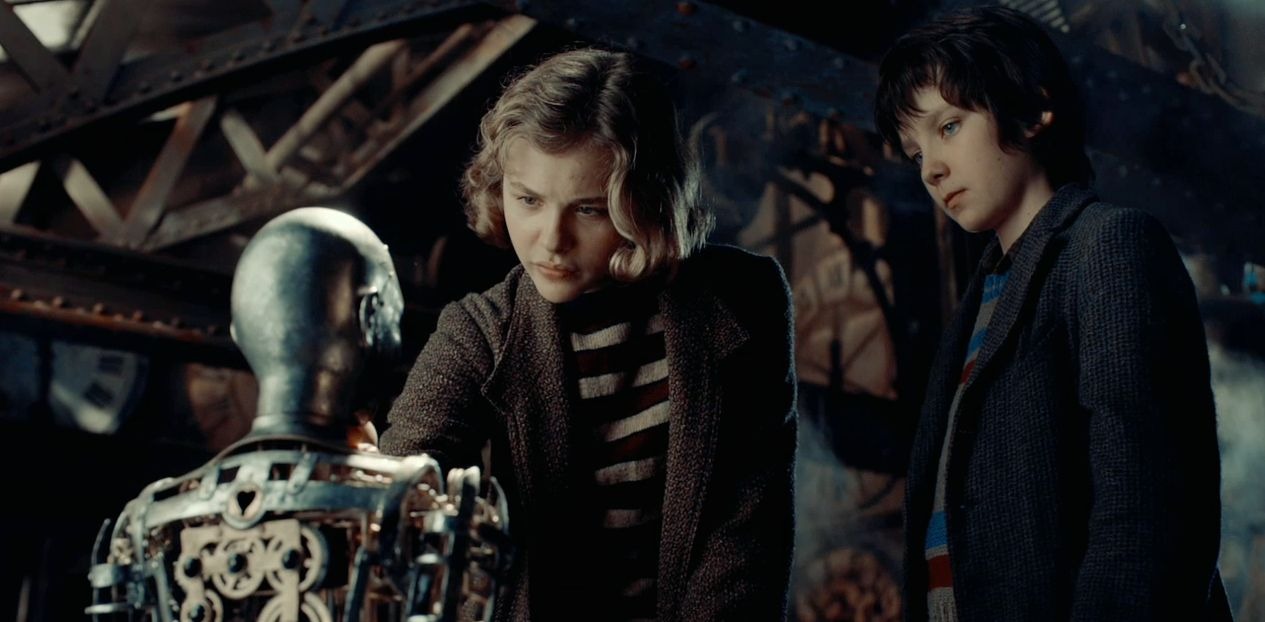From the best-selling book by Brian Selznick, you would expect someone like Chris Columbus, Robert Zemeckis, or even Steven Spielberg to helm this film, based on the popular children's novel The Invention of Hugo Cabret. Instead, you have veteran director Martin Scorcese, known for his more mature credit of work like Goodfellas, Taxi Driver and the film that finally won him an Oscar 2006's The Departed. It sounds like an odd match and it is for the first hour or so, but during the second half it becomes obvious no one could have treated the subject matter of this film with as much care and finesse as Scorcese.
The story revolves around Hugo (Asa Butterfield), an orphan living in a Paris train station, whose job is to wind the clocks. He lives alone, hidden within the walls of the station that is until he meets the sesquipedalist Isabelle (Chloe Grace Moretz, Kickass) after being caught by the station toy-maker and Isabelle's godfather Georges (Ben Kingsley, Shutter Island) for stealing toy parts. Hugo's father (played by Jude Law) was a clock smith and after his death Hugo went to work for his uncle, managing the station clocks. He took only one object with him--an automaton, a mechanical man, his father was working on, up until his death, but couldn't quite fix. Hugo believes fixing the automaton will send him a message from his father and Isabelle is more than jocund to help, because she claims it is an adventure, like the books she indulges in. But not everybody is so willing to help. The station inspector (Sacha Baron Cohen, Borat) is just waiting to catch Hugo and send him off to an orphanage, where he believes he belongs and Georges holds on to the secret of the automaton, but refuses to divulge anything to the boy who has been stealing from him.
It sounds like a children's tale and it is for the most part, but the foremost question is why Scorcese would want to tackle such a genre this late in his career? The answer is simple. This film is a film maker's dream and for a cinephile like Scorcese it's no wonder he chose such an endeavor. Simply put, it's an ode to the birth of cinema, a well crafted homage to the early, black and white era of silent film and filmmakers. Scorcese recreates, shot for shot, some of the earliest scenes from films by Melies and the Lumiere brothers. He eloquently retells their story with such a creative and innovative twist, the film oozes with his sentimental tribute to such landmark directors. The entire film feels like a personal payment of gratitude to the greats before him.
As a children's film, it doesn't quite work. It's hard to imagine young kids knowing the context of what's happening or what a silent picture is. However, I'm sure the adults taking their kids will both appreciate and respect the level of achievement behind this tale. It's more of a film about film, told through the eyes of a child. Children nonetheless will find this film just as enjoyable. Butterfield gives a very vulnerable and tender performance as the orphan who wants to fix his father's machine. In a head-scratching role, Cohen also gives a rather vulnerable performance, considering his previous films, as the station inspector and produces a few laughs. But the true star of the film are the films themselves. Just like the films of Melies, his purpose was to capture dreams onto film and Scorcese manages to achieve nothing less than that.
In the film, Hugo states, "If you lose your purpose...it's like you're broken." Scorcese's purpose is clear, to pay a tribute to the films that inspired him when he was a child. And like those films, Hugo should be an inspiration for film lovers of all ages.
Rating: A-


No comments:
Post a Comment